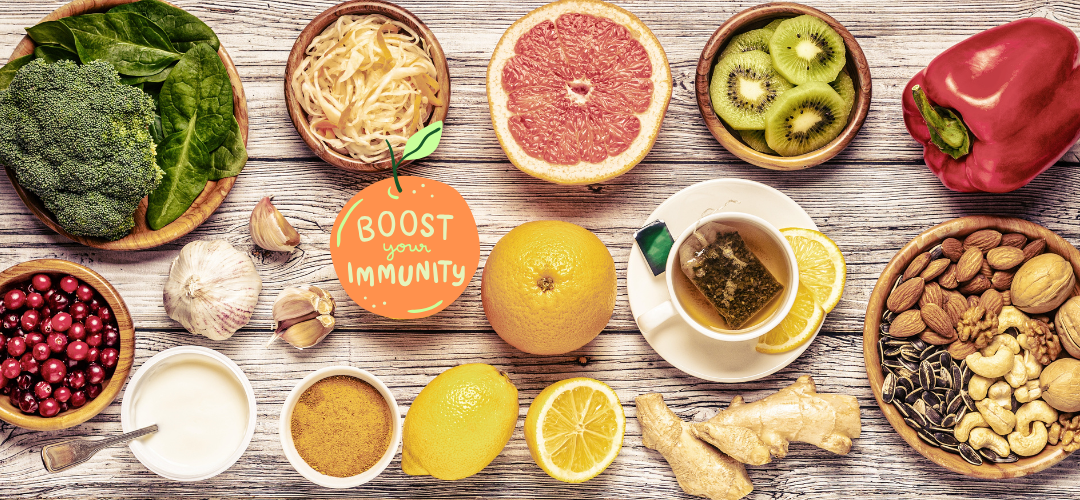on Orders over £25

Top Nutrients for Immune Support During Changing Seasons
As the weather gets colder and nights get shorter, supporting your immune system becomes crucial. Seasonal transitions can be tough on the immune system, but proper nutrition and a healthy diet can help keep it strong and functional. This article covers some of the key nutrients to focus on for immune health this autumn and winter, as well as how seasons impact immunity and various ways you can support your immune system.
Immune Health Bundle: Vitamin D3K3 + Vitamin C & Zinc
Why do seasonal changes impact the immune system?
Seasonal changes can put stress on the immune system, making the body more vulnerable to illness. As temperatures shift, especially from warm to cold, the body needs to adjust, which can temporarily weaken immune defences. Colder weather often brings more time spent indoors, where people are in closer contact, increasing the likelihood of spreading infections like colds and flu.
The changes in humidity can also affect the mucous membranes in the respiratory system, making it easier for viruses to enter. Additionally, seasonal allergies triggered by pollen or mould can further challenge the immune system, leaving it more susceptible to other illnesses.
Vitamin C: the immune-boosting superstar
Vitamin C is a vital nutrient that plays a key role in supporting immune health. As a powerful antioxidant, it helps protect the body’s cells from harmful free radicals. Vitamin C is also essential for collagen production, which strengthens skin, a critical barrier against pathogens. One of its most important functions in immune defence is boosting the production and function of white blood cells, which are responsible for fighting infections. Therefore, regular intake of vitamin C can help reduce the severity and duration of common colds by enhancing the immune system's response to infections.
You can find vitamin C in a variety of plant-based foods, making it easy to incorporate into a vegan diet. Citrus fruits like oranges, bell peppers, strawberries, and broccoli are all excellent sources. For those needing an extra boost, vegan-friendly vitamin C supplements are widely available. There are also options that combine vitamin C with other nutrients, such as Vitamin C & Zinc supplements. Consistent daily intake of this nutrient helps keep the immune system strong and ready to defend against seasonal illnesses.
Zinc: the defender against infections
Zinc is a critical mineral for maintaining a healthy immune system, playing a key role in supporting immune cell function. It helps activate T-cells, which are essential for fighting off infections, and promotes the development of other immune cells like neutrophils and macrophages. Zinc also combats oxidative stress by reducing inflammation and protecting cells from damage caused by free radicals. Without sufficient zinc, the immune response weakens, making the body more vulnerable to infections.
For those following a plant-based diet, zinc can be found in foods such as legumes, seeds, and nuts, including chickpeas, lentils, pumpkin seeds, and cashews. Zinc supplements can provide additional support, particularly during cold and flu season. Studies suggest that taking zinc supplements at the onset of a cold may help reduce the severity and duration of symptoms, as it assists the immune system in quickly responding to viral infections.
Iron: essential for immune system efficiency
Iron is a crucial mineral for maintaining a well-functioning immune system. It plays a significant role in transporting oxygen throughout the body, ensuring that immune cells, like lymphocytes, get the oxygen they need to perform efficiently. Iron also supports energy production, which is vital for maintaining overall health and enabling the immune system to respond effectively to infections. In particular, iron is involved in the development and function of immune cells, helping the body fight off pathogens and maintain strong immune defences.
For those following a plant-based diet, iron can be found in sources like spinach, lentils, tofu, and fortified cereals. Vegan-friendly iron supplements, such as iron fumarate, are also available for those needing extra support. Since the body absorbs plant-based (non-heme) iron less efficiently than iron from animal sources, it's important to pair iron-rich foods with vitamin C to enhance absorption. For example, combining spinach with citrus fruits or bell peppers can significantly improve the body's ability to utilise iron, boosting immune function. Due to this, vegan iron supplements that also contain vitamin C tend to be more effective.
Vitamin D: the sunshine vitamin for winter wellness
Vitamin D, often called the "sunshine vitamin," plays a vital role in regulating the immune system. It helps modulate immune responses by promoting the activity of immune cells like T-cells and macrophages, which protect the body from infections. Vitamin D also helps reduce inflammation, a key factor in preventing chronic illnesses. Without adequate vitamin D, the immune system can become less effective, leading to a higher susceptibility to infections, especially during the colder months.
During fall and winter, when sunlight exposure is limited, it can be difficult to maintain sufficient vitamin D levels. This is particularly true in colder climates where people spend more time indoors. To counter this, incorporating vitamin D-rich foods like fortified plant-based milks, mushrooms, and fortified cereals can help. Vegan supplements, such as lichen-derived D3, are also excellent options to ensure adequate intake. Be sure to combine it with vitamin K2 or take a supplement that contains both to ensure calcium ends up in the bones and doesn’t build up in the arteries. It’s important to monitor vitamin D levels during the winter, as deficiency can weaken the immune system, leaving the body more vulnerable to seasonal illnesses.
Other ways to naturally boost immune health
Boosting immune health naturally requires a holistic approach. A balanced diet rich in fruits, vegetables, and whole grains provides essential nutrients, while staying hydrated supports the body’s overall function, including immune responses. Regular exercise improves circulation, helping immune cells travel throughout the body more efficiently.
Other key practices include getting enough sleep, as rest allows the body to repair and strengthen its defences, and managing stress, which can weaken the immune system over time. Reducing processed foods and sugars can also minimise inflammation and support better health. During seasonal transitions, incorporating a high-quality multivitamin can help fill any nutritional gaps, ensuring the immune system remains strong and resilient.
Key takeaways
Here are the key points to remember about immune health in changing seasons:
- As the body adjusts to seasonal changes, particularly from warm to cold, immune function can falter and weaken.
- Vitamin C, Zinc, Vitamin D, and Iron are all key nutrients for immune health during seasonal changes.
- These nutrients are available via food and intake can be boosted with supplements.
- Other practices, such as a balanced diet, plenty of sleep, proper hydration, and regular exercise are all meaningful ways to support your immune system.

